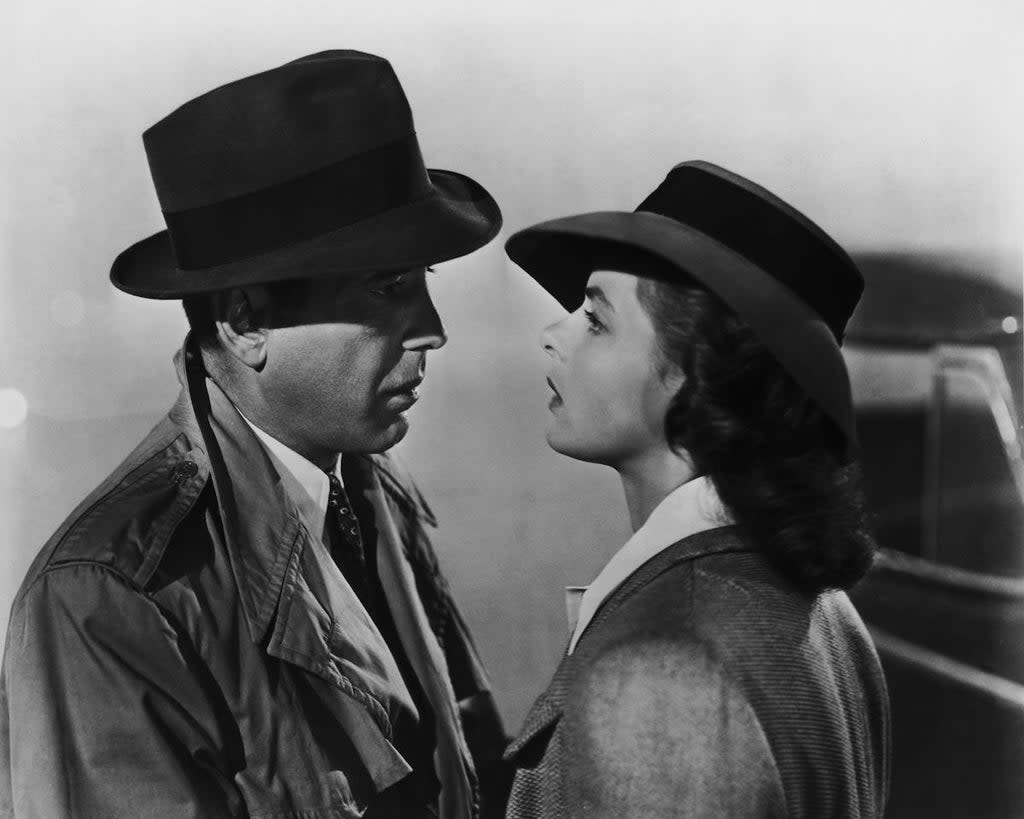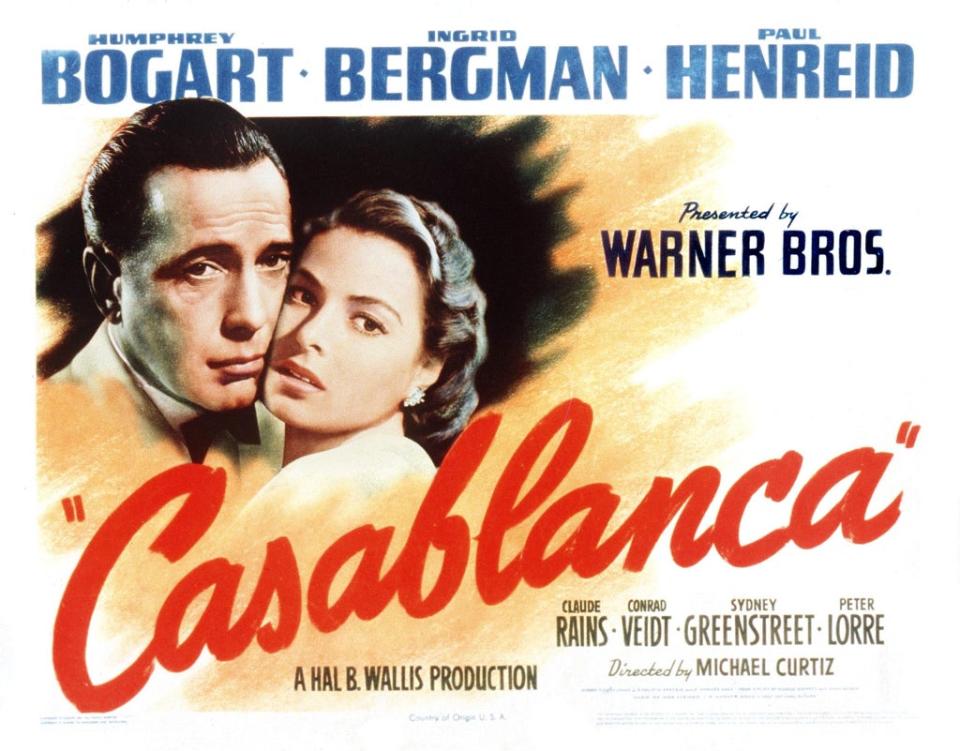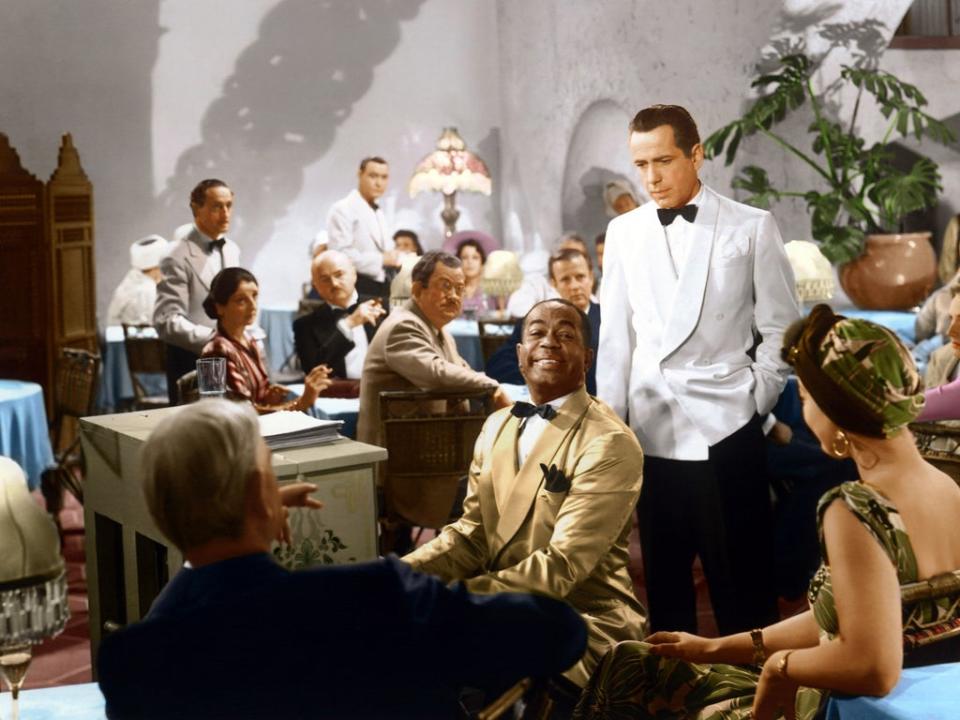Here’s looking at you, kid: Why Casablanca has stood the test of time

- Oops!Something went wrong.Please try again later.
- Oops!Something went wrong.Please try again later.
At least Ingrid Bergman and Humphrey Bogart didn’t have to self-isolate, take PCR or lateral flow tests and fill in passenger locator forms. Casablanca, which celebrates its 80th anniversary this year, is set in the middle of a war, not a pandemic. Nonetheless, one reason why this classic black and white Warner Bros movie still exercises such fascination today is that it portrays a world just like our own, in which everything is out of joint. All of its main characters are in transit or a very long way from home. Bureaucracy dominates their lives. To get anywhere, they need exit visas or letters of transit but borders are closed. They’re forced to wait and wait and wait.
“Perhaps tomorrow, we’ll be on the plane,” a young couple sigh plaintively at the start of the movie. “I’ll never get out of here. I’ll die in Casablanca,” another displaced soul says forlornly as he sips at a drink he can ill afford in Rick’s bar.
Film critics and cultural historians have spent decades trying to work out why Casablanca turned out so well. Academic treatises have been written on the subject, rounding up all the usual arguments. Was it the onscreen chemistry between Bergman and Bogart, the barbed wit in the dialogue, or the doomed romanticism encapsulated in Dooley Wilson’s performance at the piano of the torch song “As Time Goes By”?
This was one of four movies that Bogart made in 1942 and no one talks much anymore about the other three.
“Like most of the other movies made under the studio system, Casablanca was an accumulation of accidents. Seven writers worked on the script; the cinematographer and editor were men who happened to be available the week that the movie started production; and the movie’s famous last line was written weeks after the shooting had finished,” author Aljean Harmetz wrote in her 1992 book on Casablanca.
This, then, was a film made on the hoof. Neither its director Michael Curtiz nor producer Hal Wallis were thinking much about posterity when they took the project on.
“Warner Bros was like the assembly line at an automobile plant,” one of the writers, Julius Epstein, later told Harmetz about the factory-like process through which the film was produced.
It’s too simplistic, though, to suggest that Casablanca was just a happy accident – a machine-made product that somehow turned out to be unique. The film deals with situations and emotions that remain as recognisable today as they were in December 1941, the period in which its story is set. This is at once an escapist Hollywood fare and a harrowing drama about displaced people struggling to survive.
There is a very obvious contrast between the desperate plight of the real-life refugees shown in grainy archive footage at the start of the film, fleeing France by foot, and the world of the exiles who meet every night at Rick’s Cafe Americain in Casablanca. For a start, all the children and old people have vanished. Travellers stranded in the city without papers or money still have the means to order drinks at Rick’s bar. They must have left home with just the possessions they could carry but manage to dress immaculately, in evening gowns, tuxedos, uniforms and white suits.
Arguably, the film’s outer layer of cynicism is crucial to its enduring reputation. This acts as a preservative, protecting what underneath turns out to be a very delicate story about love and sacrifice. If Bogart’s Rick had been a sentimental and self-righteous type, audiences simply wouldn’t have been able to stomach him. Instead, he is a sardonic drunk with an often very vicious turn of phrase.
“Where were you last night?” Rick’s spurned lover Yvonne (Madeleine Lebeau) asks him in one early scene. “That’s so long ago I don’t remember,” he says avoiding the question. “Will I see you tonight?” she continues. “I never make plans that far ahead,” he replies. There’s a cruelty and toxic masculine bullying to the exchange that still seems startling. Surely, you think, Rick doesn’t need to be quite so brutal in dismissing a vulnerable woman far younger than himself. However, whenever the Epstein twins, Julius and Philip, were brought on to work on a script, this was precisely the type of caustic humour they were expected to deliver.

In the original play Everybody Comes To Rick’s, on which Casablanca is based, Rick was a softer, more self-pitying figure. He was “Richard Blaine of Paris, criminal lawyer, champion of lost causes”, who had been transformed into Rick, “dispenser of entertainment for Casablanca”.
“Once we knew that Bogart was going to play the role, we felt he was so right for it that we didn’t have to do anything special. Except we tried to make him as cynical as possible,” Julius Epstein said to Harmetz.
The Epstein brothers, then, provided the cynicism. Other writers on the Warner Bros production line added the dabs of selfless idealism and sentimentality which also characterise Rick.
In a 1992 essay for his BBC radio programme Letter from America, Alistair Cooke argued that Rick “represents a duality in the American character that most Americans would like to believe is their true self, tough on the outside, compassionate within”.
Not that Rick is a typical Hollywood hero. Moody, sarcastic, hard-drinking, and womanising, he is a long way removed from the clean-cut, boy-next-door type. It is not at all clear what he is doing in Casablanca in the first place. He tells Captain Louis Renault (Claude Rains) that he came there for “the waters” – although they’re in the middle of the desert. Perhaps he is trying to get over his heartbreak in France, when his fling with Bergman was so rudely interrupted by the Nazis. “The Germans wore grey, you wore blue,” he tells her in one of the film’s many endlessly quotable lines when they come face to face again in his bar. By then, though, she has her husband, resistance leader Victor Laszlo (Paul Henreid), back on her arm.
Cooke suggested that Bergman was “more than anybody the victim of a script that had eight different endings written for it [and] never knew until the last days of shooting, which ending was for keeps”. Bergman herself claimed the script was worked on day to day and that she wasn’t sure “which man I was supposed to love”.

Harmetz dismisses as myth the idea that “nobody knew how the movie would end”. The censors would never have allowed Bergman’s character Ilsa to abandon her husband in order to stay in Casablanca with Rick. She had to get on that plane. That was the whole point of the movie. It was equally obvious she still loved Rick.
Casablanca went into production just after the Japanese had invaded Pearl Harbour, when it was increasingly obvious that President Roosevelt would bring the US into the war.
The film hit US cinemas in November 1942, at exactly the time of “Operation Torch,” the Allied invasion of French North Africa. Warner Bros had originally planned to release the film in early 1943 but realised that none of their own marketing could match that provided free of charge by General Eisenhower taking the Allied forces into Casablanca. “Hollywood got there first!” the posters boasted.
It’s easy, then, to understand the film’s popularity with US audiences 80 years ago. Why do we all continue to watch it? Beyond its nostalgia value and the instant, reassuring familiarity of so many of its lines (“Here’s looking at you kid”, “Louis, I think this is the beginning of a beautiful friendship” etc), what keeps audiences coming back? For all its artifice, the film made by Warner Bros in a studio in southern California in the middle of a heatwave has an emotional truth that transcends its own kitsch. Many of those characters stranded in Rick’s bar were played by real-life refugees. Their predicament still seems horribly real today.
‘Casablanca’ is available on BBC iPlayer

